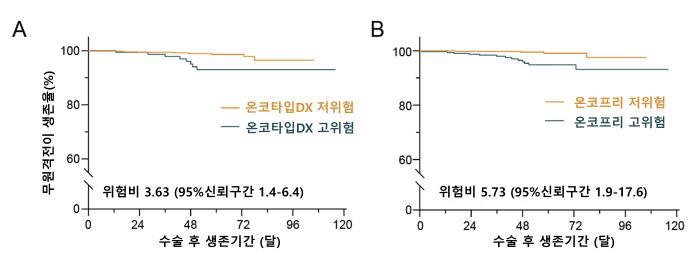Excellent on-co-free performance of domestic breast cancer prognosis prediction test...More accurate than overseas testing in younger patient populations
Apr 16, 2025
|
|
In particular, Oncopree is expected to more accurately distinguish between high-risk and low-risk groups in young patients under the age of 50 and enable customized treatment.
Professor Kang Eun-hye of Seoul National University Hospital, Professor Chun Jong-ho of Seoul Metropolitan Government Boramae Hospital, Professor Lee Sae-byeol of Seoul Asan Hospital, and Professor Yoo Jae-min of Samsung Medical Center announced the results of a study comparing the prognosis prediction performance of the two tests, Onco Type DX and Onco Free, based on data from 838 hormone-positive and HER2-negative early breast cancer patients collected from four hospitals from 2012 to 2022.
Breast cancer has the highest incidence among female cancers in the world, with hormone-positive and HER2-negative breast cancers accounting for the largest proportion. Accurate prognosis prediction in breast cancer treatment is an important criterion for avoiding unnecessary chemotherapy and planning customized treatment for patients with low probability of recurrence. However, the existing Oncotype DX analyzes 21 genes to predict the risk of recurrence, but high test costs were a problem, and there was a demand for more accurate tests. On the other hand, Oncopree analyzes 179 genes based on next-generation sequencing (NGS) to provide more information and enable sophisticated prognosis prediction.
The research team conducted an oncopre test using tumor samples from patients who received oncotype DX and analyzed how the prognosis prediction scores of the two tests are related to the risk of recurrence.
As a result, the prognostic predictive scores of Oncopree and Oncopytypes DX showed a high correlation of about 83%, suggesting that the two test methods can distinguish high-risk and low-risk groups in a similar way.
In addition, as a result of 54 months (median) follow-up, the oncopree high-risk group had a 5.73 times higher risk of distant metastasis than the low-risk group (p<0.001). This means that ONCOFREE can more accurately distinguish between high-risk and low-risk groups.
In particular, the difference between the two test methods was evident in the group of young patients under 50 years of age, which accounted for half of Korean patients. There was no significant difference in survival rate for non-remote warfare with the oncotype DX score (p=0.792), but the oncopree score showed a significant difference between the high-risk and low-risk groups (risk ratio 3.98, p=0.035). This shows that Oncopree performed more accurately predictive performance in the younger patient population.
Professor Yoo Jae-min (corresponding author) of breast surgery at Samsung Medical Center said "I think the breast cancer prognosis test developed in Korea can be an effective alternative as it shows comparable performance compared to the most commonly performed test in the world."In addition, prospective clinical studies at the global level are also underway, so expectations are high.'
Lee Sae-byeol, professor of breast surgery at Asan Medical Center in Seoul (co-corresponding author), said "Oncopri, a next-generation genetic analysis company that supplemented the limitations of existing testing methods, was able to more effectively evaluate the risk of recurrence in young patients."We expect this to be of practical help in establishing a treatment strategy tailored to the patient's characteristics" he stressed.
Professor Eun-hye Kang (first author) of breast endocrine surgery at Seoul National University Hospital said "Oncopree is of great significance in that it performed better in predicting prognosis than conventional Oncotype DX" "In the future, this test will play an important role in providing more patients with opportunities for customized treatment".
Professor Cheon Jong-ho (co-author) of Surgery at Boramae Hospital in Seoul said "This study is a meaningful study that demonstrates the performance of Oncopree, and we hope it will be widely used as a cost-effective test method in clinical settings in the future."
Meanwhile, the study was published in the recent issue of the international journal Cancer Research and Treatment (CRT).
|
This article was translated by Naver AI translator.
















